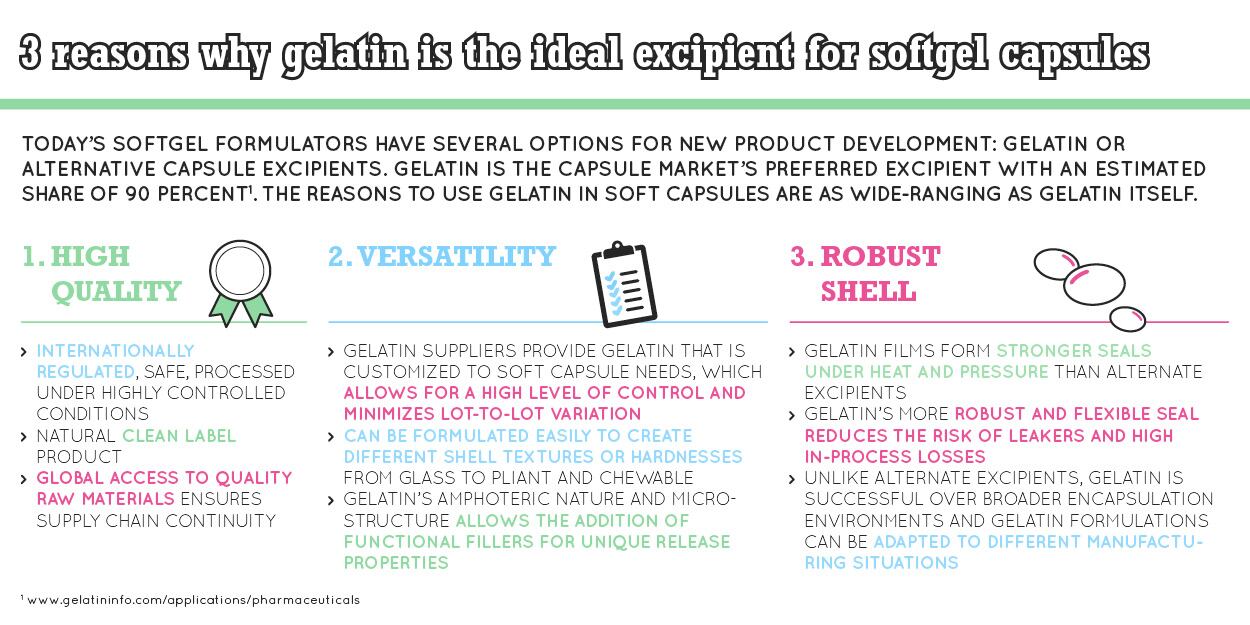As global demand for softgel capsules continues to grow, Marijo Clark, President of MC Softgel Experts and soft-capsule product formulator, explains her preference for gelatin over alternate excipients to develop new products.
A softgel capsule is an edible package that is filled and formed simultaneously. It is meant to protect ingredients that are sensitive to light and oxygen-induced degradation, facilitate oral administration, and mask unpleasant tastes or smells[1]. Softgel capsules are increasingly preferred in the pharmaceutical field for their proprieties, but also by consumers, who perceive them as easier to swallow[2]. Indeed, demand for softgel capsules is continually growing: the global softgel capsule market is expected to grow at a compound annual growth rate (CAGR) of 7.72 percent by 2026[3].
To meet growing demand and consumers’ formulation requirements, softgel capsule formulators must select the right shell excipient, compatible with fill material characteristics, to ensure a high-quality, low-risk, and robust product. Today’s softgel capsule formulators have several shell excipient options for new product development: gelatin or alternative capsule excipients, such as carrageenan and/or modified starch. When selecting a shell excipient, many product variables need to be considered, such as release profile and intended use, fill characteristics, shell/fill interactions, existing process capabilities, container/closure configuration, distribution channels, and the product’s target shelf life. Formulators need to have a complete process vision when developing a new soft-capsule product.
With a market share of more than 90 percent, gelatin is the preferred excipient for softgel capsules[4].Gelatin combines several advantages to be the excipient of choice for producing high-quality softgel capsules. This preference comes down to three of its features: its quality, versatility, and processability.

Infographic: Gelatin is the ideal excipient for softgel capsules.
A high-quality, globally accessible product
High-quality edible gelatin is available globally from multiple suppliers, so small and large users have good access to quality raw material. Gelatin is described in major pharmacopoeia monographs, is internationally regulated, and is processed under highly controlled conditions. It is produced only from edible parts of animal stock. The animal selection or source is controlled. The animal parts are handled under highly sanitary conditions and are by-products of food production, helping to reduce food waste. Gelatin is highly refined and far removed from the original animal source. For softgel, a subset of edible gelatin is needed. Gelatin suppliers are able to provide gelatin that is specific for soft gelatin capsule needs based on a well-defined raw-material specification.
Gelatin’s versatility allows the formulation of unique functionalities
Gelatin offers greater versatility when it comes to formulating a softgel capsule. Finished goods with a strong point of difference can be imagined and executed. The formulator can select a variety of gelatin types to further customize the capsule’s shell performance. Further tailoring of the capsule’s shell performance can be accomplished with additives. Gelatin’s amphoteric nature allows the gelatin to tolerate the addition of essential oils, flavors, oil-based colorants, water-soluble dyes, pigments, pearlescent, and fibers. It is even possible to add other hydrocolloids and polysaccharides to gelatin as functional fillers to provide unique release properties. Alternate capsule excipients have limitations in both the types and levels of additives that can be added. With gelatin, the expanded “tool chest” gives the formulator freedom to create a robust product with a true point of difference and unique functionality.
The production process is more effective with gelatin compared to alternate excipients
Realistically, in all soft-capsule manufacturing processes, there are always “weaknesses” or “restricted capabilities.” Output, machine utilization, yield, and waste are significant processability factors regardless of the soft capsule’s composition. Gelatin can help overcome many of the manufacturing shortcomings in existing operations as well as improving production efficiency. Indeed, gelatin films tend to be stronger and more flexible, and form a stronger seal under heat and pressure. For other soft-capsule excipients like modified starch and carrageenan, the film casting process tends to be slower and more difficult. Alternate excipients are isotropic and inelastic with a tendency to have a brittle fracture when cut, requiring dies with special cutting edges and geometries. These special die types are also more sensitive to wear and need to be refurbished or replaced more often. Gelatin on the other hand, does not require any special die roll thanks to its viscoelastic nature, thermal reversibility and anisotropy. Its robust weld reduces the risks of leakers and high in-process losses, making it the easiest soft capsule excipient to process.
As the softgel capsule market continues to grow and diversify with alternate excipients, it is important to have in mind the reality of its formulation and processability to keep up with consumers’ demands and preferences. Gelatin’s flexibility remains the optimal choice for producing high-quality softgel capsules under a wide range of process conditions.
Marijo Clark, president of MC Softgel Experts, highlights the importance of choosing the right excipient to create the best softgel capsules
Background
This expert article by Marijo Clark was created in cooperation with GROW—Gelatin Representatives of the World.
Marijo Clark is the president and founder of MC Softgel Experts, an agency based in Phoenix, AZ that provides consulting services to the dietary supplement and pharmaceutical industries specializing in the development of softgel capsules. She offers consulting for new product and process development, gelatin manufacturing and formulation development, manufacturing troubleshooting, and cGMP document development. She has over 31 years of softgel experience as well as 40 years in industry, including basic chemicals, liquid crystals, and composites for advanced military aircraft.
For more information, please visit gelatininfo.com or follow GROW on LinkedIn.
[1] https://www.gelatininfo.com/applications/pharmaceuticals.html
[2] https://globalresearchonline.net/journalcontents/volume10issue1/Article-004.pdf
[3] https://www.researchandmarkets.com/reports/5336392/softgel-capsules-market-research-report-by-type
[4] https://www.gelatininfo.com/applications/pharmaceuticals.html


